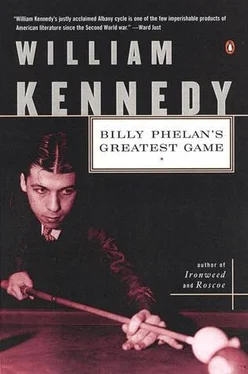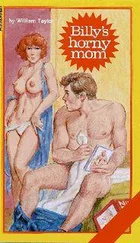“Okay, pal,” said Frankie, “it’s all yours.” And he left Billy wondering if he was really crazy Billy could cut the mustard if the third horse ran out of the money, because the day’s play was good. But if Martin Daugherty wins the parlay, Billy, it’s up in the seven, eight hundreds, even if nobody else wins a nickel. And Billy Boy, you don’t have that kind of cash. So why, oh why, is darlin’ Billy doing it? Well, it’s a gamble, after all. And Billy is certainly a gambler. Nobody will argue that. And Billy is already feeling the pressure rise in his throat, his gut, under his armpits, under his teeth and behind his jockey shorts. Christ, it tickles me somewhere, Billy thinks, and the money doesn’t matter. Pressure. Sweet pressure. Here we go again, folks.
Crosby was just winding up “Deep Blue Sea.” Billy remembered listening to it with Angie, saw her face. And then it was Morey Amsterdam on the radio. Popped into the studio as usual to ad lib with Stan. I gotta go up to the sixth floor, Amsterdam was saying. They’re gonna lay a rug up there and I wanna see how they do it.
Telephone. Martin Daugherty.
“Yeah, Friar Charles wins it, Martin, so you got something good going. Shows seven dollars, four dollars, and three-forty. Tote it up, Martin, you’re the money machine today.”
Stan was telling a caller, if you don’t like my show, you crumb, don’t listen, but if you want to make more of it than that I’ll meet you at five o’clock out in the alley behind the studio and knock your brains out. And he gave the address. Wireheaded bastard, that Stan. Billy liked his style.
Then it was quiet with no phones and only Earl (Fatha) Hines — a kid, really, so why do they call him Fatha? — playing something wild, and somebody in the chorus, when he started to move it, really move it, yelling out, “Play it Fatha. . play it till nineteen ninety-nine.” And Billy smiles, taps his foot, feels the jazz, feels, too, that good old, good old pressure beginning to cut a pulpy wedge out of his fat-assed day.
Simpson, that bum, rang Billy’s bell, looking for his sawbuck. Billy saw him coming up the walk, fished a tenner out of the cigar box, folded it once and put it in his right hip pocket. Ten down the sewer. But Billy had to pay. Tribute to Pop O’Rourke, Democratic leader of the Ninth Ward, who, six months ago, when Billy announced plans to write horses, approved the venture during Billy’s formal call. The payoff? Give ten a week to Simpson, Pop said. He’s down on his luck. He’ll come by every week for it. Fair enough, Billy said. What else could he say? And he was still paying out the tenner.
“Hello, Bill, how you doin’?” Simpson said when Billy opened the door just enough to make it clear that it was not a welcoming gesture. The Simp’s sport shirt was at least four days soiled and he needed a shave. Holes in the elbows of his sweater, boozer’s look and the breath’d knock over two mules.
“Life’s still tough,” Billy said to him.
“I thought maybe I’d come in and sit a while,” Simpson said as Billy was reaching for the ten in his pocket. And that line stopped Billy’s hand.
“What?”
“Keep you company a while. I ain’t doin’ nothin’, just hangin’ around Brady’s. Might as well chew the fat. You know.”
“No, I don’t know nothing like that,” Billy said. “You ain’t coming in now or ever.” He opened the door all the way, stepped out, grabbed Simpson’s dirty shirt, and lifted him backward down the stairs. “Now get off this stoop and stay off. Next time you put a foot on it I’ll knock your ass the other side of Pearl Street.”
“Don’t get hot, Bill. I just wanna come in and talk.”
“I don’t let bums in my home. Who the hell do you think you’re conning? From now on I don’t even want to see you on this side of the street.”
“Where’s my ten?”
“You blew it, bum.”
And Billy slammed the door and called Pop O’Rourke.
“And he says he wants to keep me company for the day, chew the fat. Listen, Pop, I respect you, but that bum is looking to see my action. I have a good half hour, he’ll want twenty instead of ten. Don’t send him back, Pop, and I mean that. I don’t like his slimy looks and I never did. I hit him once, I’ll knock him off the stoop altogether. There’s five steps and he’d clear the whole five if I hit him. I’ll break both his arms, Pop. I don’t want the bum ringing my bell.”
“Take it easy, Billy. He won’t be back. He did wrong. He’s a greedy person. I’ll tell him.”
“Fine, Pop. Do you want me to send you the tenner?”
“No, not at the moment. I’ll let you know if there’s any other needy case around.”
“I’m a needy case, Pop.”
“But there are rules, Billy.”
“I play by them.”
“That’s the good boy. Just don’t get excited. I underwent a heart attack that way, and I can tell you that getting excited is one of the worst, one of the very worst things a man can do to himself. It takes you over when you don’t expect it. Very sudden and we don’t anticipate a thing. It’s a terrible thing to do to yourself, getting too overly worked up, Billy. I wouldn’t do it again for any man.”
“I’ll catch you later, Pop. Thanks.”
“Billy, I’m very glad you called me.”
Billy hung up and scraped the horseshit out of his ear.
The first of Billy’s family came home at three-forty Daniel Quinn, age ten, resident little kid returning from fourth grade at Public School Twenty across the street, found his uncle on the couch with True Detective open on his chest, the lights out, shades drawn more than usual, the Telegraph , the Armstrong , the New York News and Daily Mirror on the floor beside the card table.
“That you, kid?”
“It’s me, Unk. Aren’t you working?”
“Get lost. I’m half asleep. Catch you later.”
And the boy went upstairs. But Billy’s eyes were open again, his gaze again on the shirty print of Mo the Kid, more properly titled “The Young Mozart,” hanging in an enormous gold frame above the couch. There sat the precocious composer, exceptionally upright, playing, no doubt, a tune of his own making, on a spinet in a drawing room baroquely furnished with gilded mirrors, heavy drapes, fringed oriental rug. The room was busy with footstools, ornamental screens, and music sheets strewn across the floor. The ladies in long, flowered gowns and chokers, clutching single sheets of music, and an older gentleman in a wig, breeches, and buckled shoes like the composer, all sat listening as the young Mo sent out his life-giving music. The three gave off non-human smiles, looking glazed and droopy, as if they’d all been at the laudanum.
The print would not have been on the wall, or in the house, if Billy had had his way. It was a gift to his sister, Peg, from their Aunt Mary, a reclusive old dame who lived in the old family home on Colonie Street, raised canaries, and had a secret hoard of twenty-dollar gold pieces she parceled out on birthdays. The picture always reminded Billy of his ill treatment by the people in that house after his father ran away and left him and his sister and their mother; ran away and stayed away eighteen years, and neither Billy, Peg, nor their mother ever heard from him again. In 1934 he came back, not to his own home but to that goddamn house of his sisters and brothers, his visit culminating in inadequately explained rejection and flight, and further silence. And so Billy hated the house for that reason, and also for the uncountable other reasons he had accumulated during his years as a never-quite-welcome nephew (nasty son of nasty Francis). The house was as worthless as the stupid picture in which Kid Mo offered up his stupid, invisible music to a roomful of dope fiends.
Читать дальше












